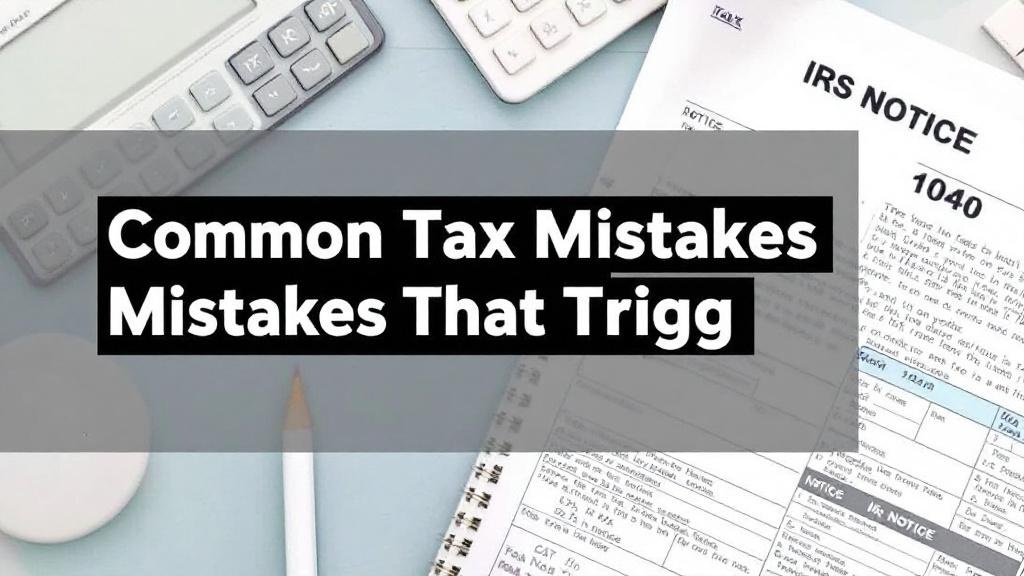Filing taxes can be a stressful and confusing process for many people, and one small mistake can lead to major headaches down the road. A tax filing mistake can trigger an IRS notice, delay your refund, or even spark an audit. In fact, common tax filing mistakes often lead to IRS notices that demand clarification, payment, or further action.
But don’t worry! With a little awareness and understanding, you can avoid the most common tax mistakes and keep your tax filing smooth and hassle-free. In this post, we’ll walk through the common tax filing mistakes that often trigger IRS notices and give you actionable tips on how to avoid them. By the end, you’ll know how to prevent IRS audits, reduce errors, and file your taxes correctly to avoid unnecessary IRS correspondence.
What Causes IRS Notices? Understanding the Basics of Tax Filing Errors
Before diving into the specific mistakes, let’s take a step back to understand why these errors happen in the first place.
The IRS uses sophisticated software and systems to cross-check the information submitted on tax returns. When something doesn’t match their records, a notice is triggered. This could be because of simple mistakes like incorrect Social Security numbers or more complex issues like mathematical errors or unreported income. Regardless of the cause, a tax filing mistake that triggers an IRS notice can lead to costly delays, fines, and even audits if not addressed promptly.
In the following sections, we’ll look at the most common tax filing errors and how to avoid them.
Top 10 Common Tax Filing Mistakes That Trigger IRS Notices
1. Incorrect Social Security Numbers (SSNs)
One of the most common tax return mistakes is entering the wrong Social Security number or Taxpayer Identification Number (TIN). Whether it’s a typo or simply entering the wrong SSN for dependents, these types of errors raise red flags with the IRS.
How to Avoid This Mistake:
-
Double-check all SSNs and TINs on your tax return.
-
Ensure that the name and number match exactly as they appear on Social Security cards.
-
Be especially careful with dependents’ information to avoid IRS notice triggers related to dependents.
2. Failure to Report All Income
When filing your taxes, it’s important to report all sources of income, including wages, tips, freelance work, and investment income. Failing to report income can easily trigger an IRS notice.
How to Avoid This Mistake:
-
Review your income documents, such as W-2s, 1099s, and other income statements, before filing.
-
If you’ve worked freelance or as an independent contractor, make sure all 1099 forms are accounted for.
-
Don’t forget to report side income, gig economy earnings, or rental income.
3. Math Errors on Tax Forms
Mathematical mistakes are another frequent trigger for IRS notices. Whether it’s a simple calculation error or a miscalculation of deductions, the IRS will flag returns with these types of mistakes.
How to Avoid This Mistake:
-
Double-check your calculations or use tax software that can automatically do the math for you.
-
Consider using the IRS’s online tools to cross-check your numbers.
-
If you’re manually calculating, take your time to ensure everything adds up correctly.
4. Incorrect Filing Status
Choosing the wrong filing status can cause confusion and lead to IRS notices. For example, some taxpayers mistakenly file as “single” when they’re eligible for “head of household” status, which could result in missed deductions or credits.
How to Avoid This Mistake:
-
Review the IRS filing status guide to ensure you’re selecting the correct one.
-
If you’re unsure, consult a tax professional to ensure you qualify for certain tax benefits.
5. Missing or Incorrect Deductions and Credits
Taxpayers often overlook or incorrectly apply tax deductions and credits, such as the Earned Income Tax Credit (EITC), Child Tax Credit, or other available deductions. This can trigger a notice from the IRS, especially if it results in underpayment.
How to Avoid This Mistake:
-
Thoroughly review your eligibility for each tax credit and deduction before filing.
-
Use tax software to ensure deductions are applied correctly or seek professional help if you’re unsure.
-
Keep receipts and records of any deductible expenses you plan to claim.
6. Filing Errors for Self-Employed Individuals
For freelancers, contractors, and business owners, there are many common mistakes, such as missing self-employment tax payments or incorrectly calculating deductions for business expenses.
How to Avoid This Mistake:
-
Use accounting software or a tax professional to help track income and business expenses.
-
Make sure you pay your self-employment taxes and file the correct forms (e.g., Schedule C or Schedule SE).
-
Avoid mixing personal and business expenses to ensure you’re deducting only legitimate business costs.
7. Failing to Sign or Date the Return
Believe it or not, many taxpayers forget to sign or date their tax return. This is a simple mistake, but it can cause your return to be rejected or delayed, triggering an IRS notice.
How to Avoid This Mistake:
-
Always check the signature section of your tax return before submitting.
-
For e-filers, make sure you’re using the appropriate PIN or e-signature.
-
If filing jointly, both spouses must sign the return.
8. Not Filing or Paying on Time
Failing to file or pay your taxes on time can lead to penalties, interest charges, and, in some cases, IRS audit triggers. Even if you can’t pay the full amount, it’s important to file your return and make partial payments to avoid additional charges.
How to Avoid This Mistake:
-
Set a reminder for the tax deadline and file early to avoid last-minute errors.
-
If you can’t pay your taxes in full, set up a payment plan with the IRS or apply for an extension.
9. Mistakes When Filing Taxes Online
For those filing taxes online, it’s easy to make mistakes, especially when entering personal details or choosing the wrong tax forms. Common errors when filing taxes online include not using the correct form (e.g., 1040 instead of 1040EZ) or missing critical data.
How to Avoid This Mistake:
-
Use reputable tax software with a guided interview process.
-
Double-check each section of your online form before submitting it.
-
Seek assistance if you’re unfamiliar with tax filing or have a complex return.
10. Incorrect Bank Account Information for Direct Deposit
If you’re expecting a tax refund, entering the wrong bank account number or routing information for direct deposit can delay your refund and lead to an IRS notice.
How to Avoid This Mistake:
-
Carefully verify your bank account details, especially if you’re entering them manually.
-
Double-check routing and account numbers to ensure they match your financial institution’s records.
What to Do If You Receive an IRS Notice
If you do receive a notice from the IRS, don’t panic. IRS notices often contain clear instructions on what actions you need to take to correct any issues. Here are some steps to follow:
-
Read the Notice Carefully: IRS notices are typically detailed and will explain exactly what needs to be corrected.
-
Gather Your Documents: If the notice relates to an error you made on your return, gather the relevant tax documents to verify your claims.
-
Respond Promptly: If the notice requires you to take action, do so as soon as possible to avoid additional penalties or interest.
-
Consider Professional Help: If you’re unsure about how to respond or need help correcting errors, consider consulting a tax professional.
FAQs: Common Questions About IRS Notices and Tax Filing Mistakes
1. What mistakes cause IRS notices?
Common mistakes that cause IRS notices include mathematical errors, incorrect Social Security numbers, and missing or incorrect income reporting. These mistakes often trigger IRS checks and request further clarification.
2. How can I avoid IRS audit triggers?
To avoid IRS audit triggers, ensure that your income is reported correctly, deductions are legitimate, and you’ve filed your taxes accurately. Using tax software or hiring a tax professional can reduce the risk of mistakes.
3. What are the top reasons for IRS tax return rejections?
Top reasons for tax return rejections include incorrect filing status, mismatched personal details, and missing or incorrect Social Security numbers. Review your return carefully to avoid these errors.
4. What mistakes delay tax refunds?
Mistakes like incorrect bank account information, math errors, or failure to sign your return can delay tax refunds. Always double-check your information before submitting your tax return.
5. Why did I get a notice from the IRS?
Receiving a notice from the IRS could be due to a mistake on your tax return, such as misreported income, incorrect deductions, or errors in personal information. The notice will explain the reason and the necessary steps to resolve it.








Comments (0)